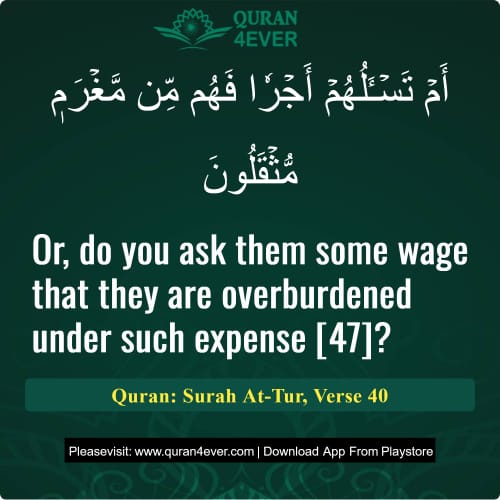
Transliteration:( Am tas'aluhum ajran fahum mim maghramim musqaloon )
"Or, do you ask them some wage that they are overburdened under such expense [47]?"
The disbelievers falsely claimed that the Prophet ﷺ proclaimed Prophethood to gain wealth and leadership.
The verse refutes this by pointing out that if this were his intention, he would have placed a tax on his message and asked for wages for his work.
Instead, the Prophet ﷺ gave freely and did not demand anything from anyone.
This shows that their claims are false and baseless, as the Prophet ﷺ’s mission was not for personal gain but for the truth of Allah.
The tafsir of Surah Tur verse 40 by Ibn Kathir is unavailable here.
Please refer to Surah Tur ayat 35 which provides the complete commentary from verse 35 through 43.
(52:40) Or is it that you ask of them any recompense so that they should fear to be weighed down under the burden of debt?[31]
31. The question is actually directed to the disbelievers. It means: If the Messenger had a selfish motive and had been exerting only for a personal gain from you, there would be a rational ground for you to avoid him. But you yourselves know that he is absolutely selfless in his invitation and is exerting himself only for your own benefit and well-being. Then, how is it that you are not even inclined to listen to him with a cool mind? There is also a subtle hint in this question. Like the self-styled guides and guardians of religious shrines of the world, the religious guides, priests and scholars of the polytheists of Arabia also were engaged in a religious business. In view of the same, this question was put before them: On the one hand, these dealers in religion are openly receiving gifts and offerings and fees for every religious service from you; on the other hand, a person who has ruined his trading business, is trying to show you the right way with highly rational arguments, absolutely selflessly. Is it not sheer senselessness that you shun him but run after them?

For a faster and smoother experience,
install our mobile app now.
Related Ayat(Verses)/Topics